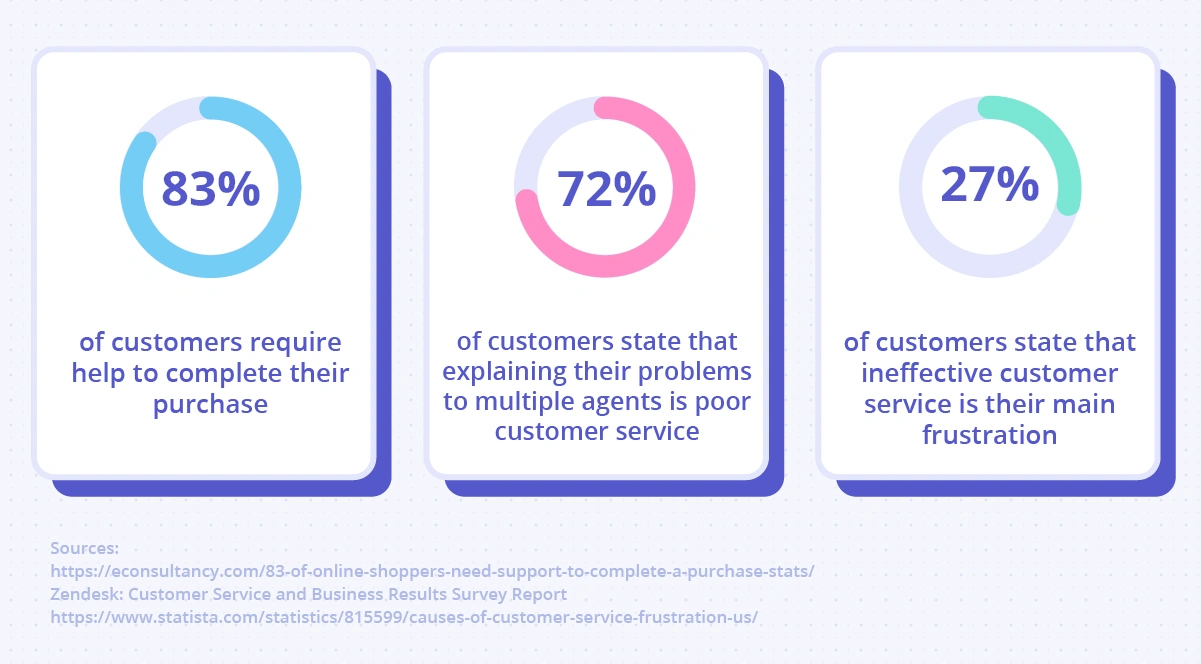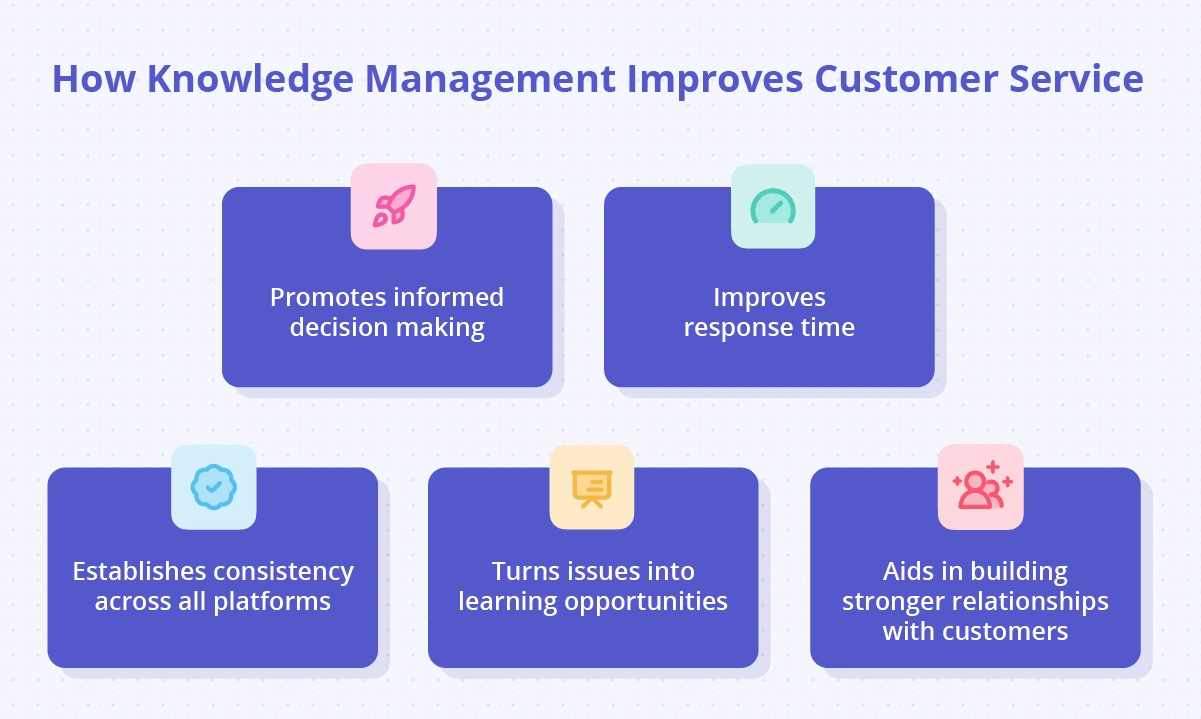Customer service knowledge management is a strategic approach to the storage and dissemination of information used in enhancing customer service. It involves the creation, sharing, use, and management of knowledge among customer service representatives to ensure they have the necessary information at their fingertips.
With 27% of consumers stating that ineffective customer service is their main frustration, knowledge management is a solution aimed at providing high-quality service and experiences to customers. Its central tenet is grounded in the belief that knowledge is power, especially when it comes to providing quick, accurate, and efficient solutions to customer queries and issues.
Why is knowledge management in customer service important?
Knowledge management in customer service is rapidly becoming a crucial aspect of everyday operations in businesses and organizations. Since 72% of customers state that explaining their problems to multiple agents is poor customer service, knowledge management is not merely a nice-to-have element in customer service but a fundamental attribute that directly determines the overall customer experience.
Most consumers require help to complete their purchase, and when customer service representatives possess comprehensive, up-to-date information about customers, their preferences, their previous interactions, and issues, they are better equipped to provide personalized service. Moreover, effective knowledge management can help customer service reps respond quickly and accurately, eliminating unnecessary delays and reducing customer frustration.
Through customer service knowledge management, businesses can maintain consistency in responses and communications across different service reps and communication channels. Consistency helps build trust with customers and contributes to the professional image of the organization.

The relevance of customer service knowledge management systems
Delving deeper into the knowledge management customer service domain, numerous systems are deployed to facilitate effective knowledge management. These include knowledge repositories, databases, intranets, communication technologies, and collaboration tools, among others.
These systems, collectively referred to as knowledge management systems, allow businesses to capture, store, retrieve, share, and disseminate knowledge across the customer service department and the wider organization. What essentially sets these systems apart is their ability to consolidate information from multiple sources, process it, and then disseminate it in an easily accessible format for customer service representatives.
An excellent illustration of this is a company-wide knowledge base that stores procedures, customer data, information on products and services, and solutions to common customer issues. When all customer service reps can quickly access this resource, it improves their ability to resolve customer queries efficiently. In addition, collaboration tools can enable customer service reps to share experiences, insights and learn from each other, thereby collectively growing their knowledge base.
The relevance of different customer service knowledge management types and knowledge management systems inherently lie in their ability to streamline procedures and improve customer engagement. By having relevant and organized data at their disposal, customer service representatives can quickly access pertinent information, thus reducing wait times and enhancing customer experiences. Furthermore, the stored knowledge can be leveraged across various customer service channels, thereby promoting consistency and cohesion in brand communication.
Analytics, artificial intelligence, and automation are some technological integrations that can amplify the efficiency of a system, making it more responsive and customer-centric. These can foster substantial long-term cost savings as these systems perpetuate reduced call times and leaner operations, thus leading to increased productivity. Plus, the augmented service quality and improved customer satisfaction can stimulate customer loyalty and retention, indirectly contributing to revenue growth.
Knowledge management for customer service is not just about having a repository of information. Rather, it extends to creating a conducive environment promoting knowledge sharing, continuous learning, and effective use of the acquired knowledge in serving customers.
How knowledge management improves customer service
Knowledge management in the realm of customer service can be conceived as a scientific approach to the creation, storage, and application of knowledge to enhance service experiences. Essentially, this process involves accumulating a deep understanding of the various issues customers encounter, cataloguing these instances, and applying the acquired knowledge to address future concerns promptly and efficiently. By managing the distribution of this knowledge to customer service agents, organizations can ensure an elevated level of customer satisfaction and foster enduring customer loyalty.
Promotes informed decision making
A comprehensive knowledge management strategy ensures that all information related to a customer's history and interactions with the business is accessible in real-time. This gives customer service representatives a wealth of knowledge to draw upon when interacting with clients, enabling them to provide personalized and accurate advice, product recommendations, or problem resolutions.
Improves response time
An adequately streamlined and accessible knowledge repository reduces the time representatives spend looking for information by up to 35% and increases productivity by 25%, meaning clients receive responses faster. Efficiency is vital in customer relations; research reveals that customers' satisfaction rates decline drastically if they are kept waiting for long periods.
Establishes consistency across all platforms
Consistency is essential in maintaining a positive customer service experience, and having a knowledge management system in place ensures that customers receive the same caliber of service whether they're interacting with a business via telephone, live chat, email, or in person.
Turns issues into learning opportunities
By categorizing and analyzing different customer interactions and outcomes, companies can identify prevailing issues or misunderstandings, adjust their practices, and continuously update their database to boost customer satisfaction.
Aids in building stronger relationships with customers
When customers consistently receive informed, quick, and proficient service, their trust in the company strengthens. Consequently, companies with robust knowledge management systems enjoy increased customer loyalty, positive word-of-mouth, and reputation enhancement - hallmarks of successful businesses in any industry, from financial services to insurance to retail.

Knowledge management customer service best practices
A company's understanding of customer needs can be valuably enshrined in knowledge bases which assist in streamlining responses to customer queries. Adequate training of customer service representatives in leveraging this knowledge can result in quicker issue resolution, enhanced customer satisfaction, and a potential increase in customer loyalty. Subsequently, practices that foster superior knowledge management are crucial to customer service operations.
Centralize customer service knowledge
By consolidating all customer service knowledge into a single easily accessible platform, organizations can promote quick response times and ensure consistency in communication. This gets rid of the need for customer service representatives to scavenge through multiple systems, thereby minimizing response times and boosting customer satisfaction.
Promote a culture of knowledge sharing
To make their knowledge management systems a success, organizations should instigate a culture where customer service representatives regularly document and update the system with new insights, experiences, and customer feedback. This acts as an invaluable resource for the entire team and potential allies, contributing to the efficiency and effectiveness of customer service delivery.
Continuously update the knowledge management system
Businesses need to recognize that their knowledge management arrangements should not be static. As markets, customer needs, and technologies evolve, so should their knowledge management systems stay relevant and provide effective customer service responses.
Incorporate analytics as part of knowledge management
By applying analytical measures to captured data, organizations can identify gaps in their customer service delivery, frequently asked questions, or recurring problems. This data can then be used to improve their products, services, or even modify their knowledge management systems for better results.
Include customers in the knowledge management process
Encouraging customers to contribute their experiences, suggestions, and solutions can considerably enhance the scope and richness of the knowledge base. It prompts the development of a customer-centered approach to knowledge management, fostering strong customer relationships and engendering trust and loyalty.
Customer service knowledge management in your organization
Knowledge management goes beyond its traditional confines of ensuring internal efficiency, reflecting its importance in the modern, customer-centric business paradigm. By implementing knowledge management in customer service, companies can stay ahead in a competitive marketplace and fortify their relationships with customers, driving loyalty, satisfaction, and ultimately, business growth.
Read our customer success stories to learn how organizations from industries such as utilities, insurance, finance, and government were able to effectively use knowledge management to elevate their customer service to new heights.



